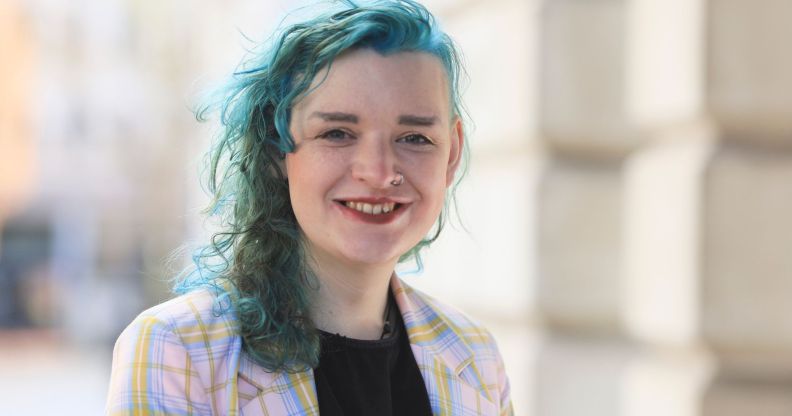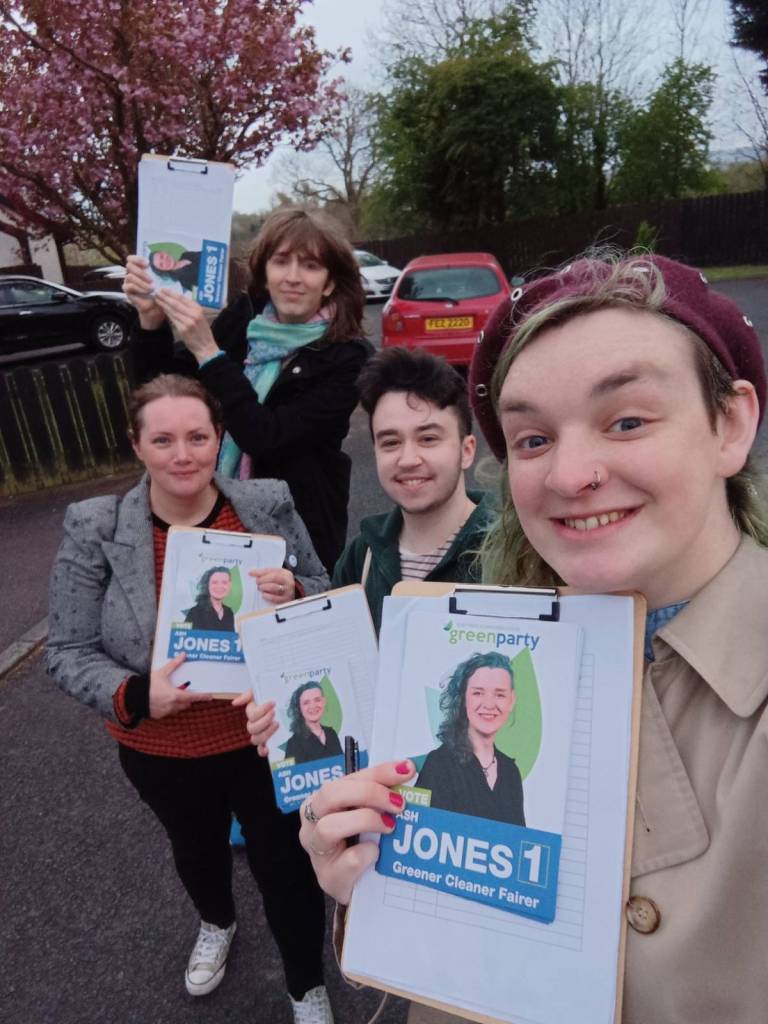Meet the punk musician running to become Ireland’s first openly trans elected representative

Trans activist ash Jones says having an openly trans elected official in Ireland would create “another layer of visibility” for the community. (ash Jones/Green Party Northern Ireland)
Punk musician and activist Ash Jones says becoming the first openly trans elected representative in Ireland would send a clear message that transgender people aren’t “hiding away”.
Jones has been active in politics for a while, but only recently decided to put herself forward as a Green Party council candidate for West Belfast’s Colin district.
If successful at the polls today (18 May), Jones will be the first out trans elected representative on the island of Ireland, and the area’s first Green councillor.
The decision to run in the local elections was centred on having a trans voice speaking out for the community amid a wave of inflammatory anti-trans rhetoric published by the media and politicians in the UK and Northern Ireland.
“While we have less of a problem with transphobic politicians in Northern Ireland than [the rest of the UK] does, there’s still an incredibly long way to go,” she tells PinkNews.
“And in terms of having that representation, that visibility and being able to act as that voice for the trans community, I thought it was the right time to put myself forward.
“I’m well in the knowledge that there’ll be some abuse coming in, but I’m in the relatively privileged position where my material needs are mostly cared for.
“For many trans people, that is not the case. So, I’m able to go to another layer of visibility and be able to withstand it that little bit better.”

That representation is crucial as Jones believes it creates “more of a bulwark” against the “scapegoating” of trans people by the right-wing in the media and politics.
The activist says queer people and feminists across Ireland, but in Northern Ireland specifically, are “quite good at calling out transphobia and rejecting transphobia” compared with others “across the water”.
Ash Jones continued: “Having that public visibility, public representation and to be able to say ‘Yes, a trans person is here in these positions that you wouldn’t necessarily expect’, [means] we’re not hiding away and actually doing good.
“I hope it helps guard against being scapegoated and used as a punching bag from the sort of insurgent far-right, fascistic movement that is just trying to destroy us.”
Trans people have faced increasing levels of violence and hostility in Northern Ireland
The Police Service of Northern Ireland said there were 70 recorded transphobic incidents in the province in 2022, compared with 62 the year before. That’s more than double the number of anti-trans incidents reported in 2018-19.
In April, a massive crowd of trans rights advocates and allies drowned out hate spewed by anti-trans activist Posie Parker, during the Belfast stop of her Let Women Speak campaign.
The LGBTQ+ community and allies gathered in the city to show solidarity with trans and non-binary people. They held up a kaleidoscope of queer flags and unfurled an enormous banner that read: “The North says trans joy.”
In the run-up to the local elections, there have been some heartwarming moments that have stood out for Jones. The activist is part of a local community choir, and she received immense support from the group during the campaign.
“I posted in the group’s WhatsApp when I needed local residents to sign my nomination form to officially stand, and they’re all very excited and very supportive that I will be standing,” Jones says.
“[It] was incredibly sweet that a lot of mostly middle-aged or elderly women banded around and said: ‘Yeah, we’re with you’.”
Jones adds that seeing the support in her local community while knocking on doors has acted as a “tonic compared with the very targeted harassment you’ll see online”.
She describes how online anti-trans voices will claim trans people are misogynists and that trans women are “culturally appropriating womanhood”.
Jones continues: “The absolute barrage of that stuff can get to you and get inside your head. But then going out, knocking on doors, talking to people, meeting people one-to-one about the issues they’re having, and knowing that you’re on the same page as them, really warms my heart when I compare that experience with the experience that transphobes want me and all trans people to have: isolation and insecurity.”
Activists have lambasted media outlets across Ireland for their coverage of trans issues
Trans advocates have denounced what they have branded “harmful transphobic articles” published by the Irish Independent, while LGBTQ+ activists also called out national broadcaster RTÉ for “harmful, anti-trans discussions”.
Since the Trans Writer’s Union decided to start a boycott against The Irish Times in August 2021, many groups, universities and organisations have followed suit.
The boycott began in response to an article published by The Irish Times with the headline “Bill to ban conversion therapy poses problems for therapists”, which received significant criticism from trans activists and allies.
The union and other parties also claimed that the paper’s “recent editorial stance has been anti-trans”.

